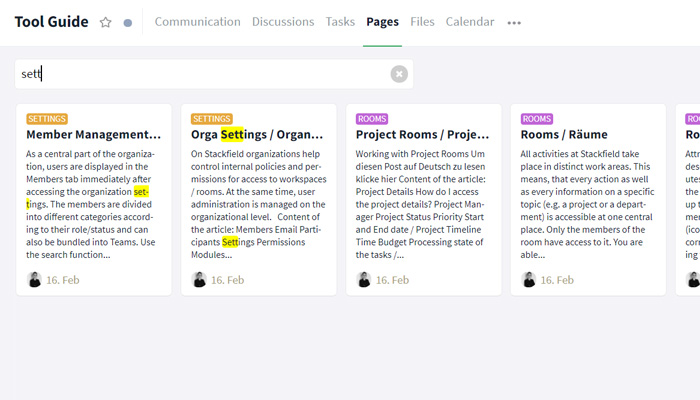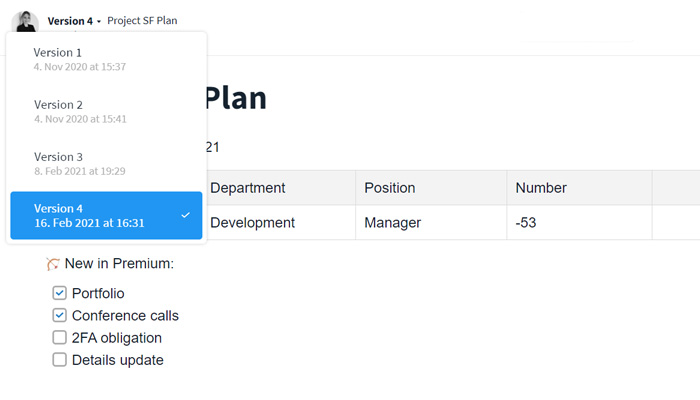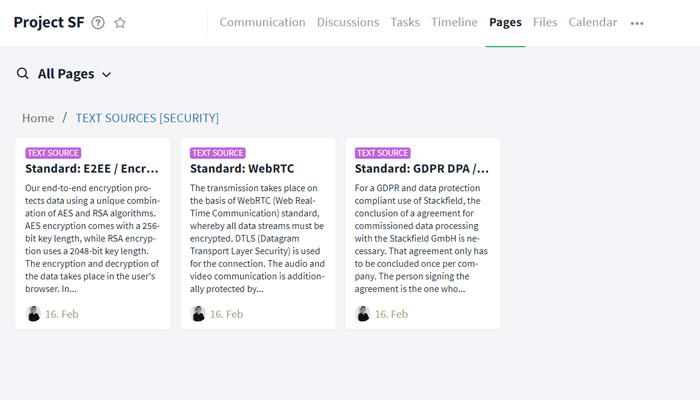Knowledge management is what it's all about, and Stackfield provides us with a feature that allowed us to create a perfect internal knowledge base, and this features can certainly optimize knowledge management in your company as well.
Working from home comes with a few advantages, of course. In my case, it's especially the commute I save (1.5 hours every day!!) and the fact that my comfy purple sweatpants are now "work-appropriate". In addition (someone as happy about this as I am!?) you can eat spaghetti aglio e olio and the like whenever you want without feeling guilty towards your colleagues. So yeah, there are quite a few benefits. But, honestly? Some things are annoying, too.
Face-to-face exchange with colleagues: not existent. The support you get simply by being part of a well-functioning team in the office: nope, not right there. A short specific question to someone from the specialist department: no way, what do you even think? It's only small things, but having to wait more often for feedback on the small questions that arise in between eats up time.
Since we started working from home, we had to make sure that all important questions and key data are stored in a way that allows us to have them quickly at hand. While this is not a substitute for every question, it does eliminate the need for a lot of them. The wiki pages provide a perfect basis for creating an internal knowledge base. They are the first place for people to go to find answers to all kinds of questions and uncertainties, and they are a helpful support for new employees during the onboarding process. It's not necessary to know everything right away and remember every detail. It is only important to know where the necessary information can be found.
Wiki Pages Knowledge Base: all background information right where you need it
Stackfield's wiki pages provide the ideal place to create a knowledge base for the entire company, where all important information is recorded - systematically, clearly and easy to find.
Clearly structured knowledge management
Employees work on projects, they develop marketing campaigns, they take care of personnel matters, they handle customer inquiries ... the list goes on. There is a whole lot of background information, collaboration guidelines and key data that needs to be managed in an organized way.
The simplest option: different knowledge base channels for different topics. The big advantage: these channels already exist!

In Stackfield, collaboration in different teams, projects and departments takes place in individual rooms. Once you store knowledge directly within the corresponding rooms, they will find the information automatically where you need it to be. This creates a sophisticated system without a lot of effort. A good folder structure, that allows you to further categorize the pages within a room, will do the rest.
For basic information that cannot be assigned to any department or project, you can create a separate room, e.g. to store useful information on internal processes for company employees.
Quickly find the right page using the search
With the help of the module search, individual pages can be found within seconds, no matter how much knowledge has been accumulated over time. All you need to do is enter a keyword.

Tip: Consider different terms. For example, if your team uses different languages, e.g. german and english, it makes sense to store important keywords in the title in both languages.
These features make Wiki Pages a great knowledge base tool

The wiki pages are a really great feature for us to centrally store everything we need to access on a daily basis. These features make them a great knowledge base tool:
- Versioning: Old editing statuses and the latest updates always remain accessible.
- Formatting: Tables, links, text formatting options and images help to present all information in a clear and well-structured way.
- File attachments: Files can be easily attached or linked, which is why all information remains centralized.
- Marker comments: You can directly address individual image contents and simply check them off after clarification. This facilitates collaboration on pages.
- Labels and folders: With the help of folders and labels, you can create order and easily assign content to a topic.
- Links: You can generate a link to each page that can be embedded elsewhere. This means that content does not have to be stored multiple times, and members have additional information quickly at hand as needed without having to slog through an entire essay.
- Search: The module search ensures that members who want information on a specific topic can quickly find the right page.
Use Cases: one page and many opportunities for your knowledge base
Of course, any type of information can be documented within the wiki pages in order to make it available centrally for the entire team. Therefore, the way these pages are used varies greatly depending on the team and the type of collaboration. Just to provide some ideas... this is how the feature could simplify knowledge management in your organization:
Planning projects

To manage our projects, we create rooms on Stackfield with the room type "Project Room", where we can easily track all our goals using the project overview and the Gantt Chart However, in order to be able to track goals, you first need to properly outline them, and this is where the pages come into play.
Due to the versioning option, the latest status is always obvious to everyone. Various formatting options allow the project manager to clearly list all requirements, and with the help of the marker function, you can directly address individual page areas to keep changes to the plan traceable and inform users about them directly.
FAQs and Onboarding

A list of frequently asked questions (FAQs) not only helps customers to quickly get a good impression of your product or service. This system also helps your employees to complete their tasks and to perfectly master the internal processes.
What can we say... Our FAQs pages are being accessed every day by every employee to get quick answers to important questions and they make work a lot easier. What's great about them, too: they're a miracle tool during onboarding and ensure that our employees quickly find their way around, become familiar with internal processes and understand our tool. We have created FAQs for the following topics:
Tool Guide: Our "Tool Guide" holds information on how all the features on Stackfield work, including all the questions that customers may have or frequently ask, in order to provide quick assistance.
Quick Start: New colleagues get access to our onboarding room, with pages that inform them about all internal departments and their areas of responsibility, about how to securely work from home, as well as about collaboration guidelines (e.g.: "How do I create a bug report?").
Community: How should I proceed in case of illness? Who is the person to contact when it comes to HR matters? What do I have to consider when submitting a vacation request? Everything employees need to know that although it has nothing to do with the work itself, we store in detail on pages in a room specially created for this purpose.
Master meetings

Meetings can be demanding and time-consuming, but with the right tool, you can manage them with ease.
Record the agenda on a page in advance and link the page to the meeting event in Stackfield. That way, everyone has access to a step-by-step guide during the meeting. Not only does this reduce the risk of constantly going off topic. The agenda also guarantees that all important points receive clarification.
Tip: Create a checklist and check off everything that has already been discussed!
During the meeting, notes can then be recorded directly on the page in order to keep all decisions transparent in hindsight.
Providing standard texts

Because of the features mentioned above, we also store all of our content in the pages - be it texts for the website, text modules for the tool or explanation texts for our customers. In the pages, you can easily organize them using folders and labels, but you can also filter and search them, so they are quickly at hand as soon as they are needed. Again, the versioning function helps to keep the latest information up to date and to retrieve processing statuses.
Three golden knowledge base rules
Collaboration in every department, in every team, and on every topic has its own unique approaches and characteristics. Yet, it is important to define rules that support these procedures - also for the knowledge base:
1. Order is when you know where you shouldn't even start to search!
All important key data and basic information on a specific project, department or team related work will be stored centrally in the corresponding room. This way, all members know where to look for the information they need.
2. Yesterday everything was different!
Status and labels remain up to date. This way, you avoid misunderstandings regarding their affiliation and currency.
3. Those who think this is chaos, simply don't understand the system!
If information is stored according to a certain scheme, everyone will stick to it. That means: Labels are mandatory to use. Page titles follow a predefined structure with the most important keywords. This way, filters as well as the global and room-specific search can be used efficiently.
Some things are more important than knowledge, because - as Einstein put it quite some time ago - "knowledge is limited". However: Until we reach these limits, we can ask many questions, fill many pages, and in this way we will all know a little bit more every day. Of course, a detailed knowledge base is no substitute for the team during home office, but it makes work a whole lot easier!